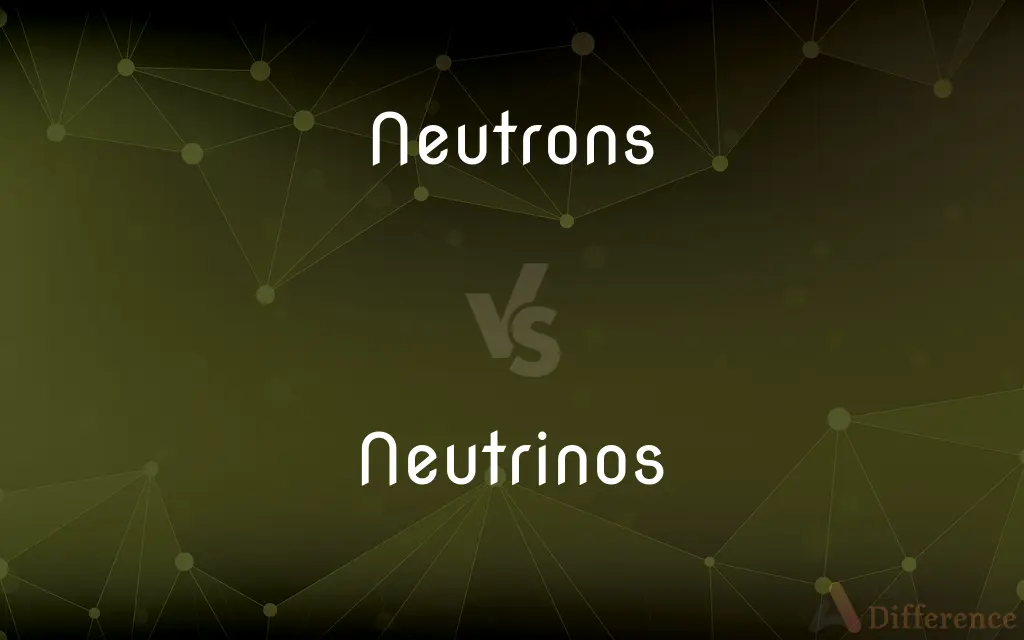Neutrons vs. Neutrinos — What's the Difference?
Edited by Tayyaba Rehman — By Fiza Rafique — Published on December 10, 2023
Neutrons are neutral particles in atomic nuclei, while Neutrinos are nearly massless, chargeless particles from nuclear reactions.

Difference Between Neutrons and Neutrinos
Table of Contents
ADVERTISEMENT
Key Differences
Neutrons are subatomic particles found in the nucleus of atoms, having no electric charge. Neutrinos, in contrast, are elementary particles that barely interact with matter and are almost massless.
Neutrons play a crucial role in atomic stability, as they, along with protons, make up the bulk of atomic mass. Neutrinos are products of certain nuclear reactions, like those in the sun, and are known to pass through vast amounts of matter unaffected.
While Neutrons are a component of atomic nuclei and can be isolated in specific reactions, Neutrinos are elusive, with detection being a significant challenge due to their weak interaction with other particles.
The discovery of Neutrons in the early 20th century refined our understanding of atomic structure. On the other hand, Neutrinos continue to be a subject of study, with scientists exploring their minute masses and potential types.
In summary, while Neutrons are integral to atomic nuclei, giving atoms their mass and properties, Neutrinos are mysterious particles, known more for what they don't do (interact with matter) than what they do.
ADVERTISEMENT
Comparison Chart
Definition
Neutral particles in atomic nuclei.
Nearly massless particles from nuclear reactions.
Charge
Neutral (no charge).
Neutral (no charge).
Mass
Relatively massive (comparable to protons).
Almost massless.
Interaction
Interact via strong nuclear force.
Rarely interact, known for weak interactions.
Source
Found in atomic nuclei.
Produced in nuclear reactions, e.g., in stars.
Compare with Definitions
Neutrons
Neutrons contribute to an atom's mass and stability.
Adding or removing neutrons can change an element's isotope.
Neutrinos
Neutrinos rarely interact with matter.
Trillions of neutrinos from the sun pass through us every second.
Neutrons
Neutrons interact via the strong nuclear force.
In the nucleus, neutrons and protons are bound together by strong interactions.
Neutrinos
Neutrinos are produced in nuclear reactions.
Nuclear fusion in the sun releases a tremendous number of neutrinos.
Neutrons
Neutrons can be emitted in specific radioactive decays.
Some unstable atoms release neutrons during decay.
Neutrinos
Neutrinos are nearly massless subatomic particles.
Despite their abundance, neutrinos are hard to detect.
Neutrons
Neutrons are uncharged particles within atomic nuclei.
The nucleus of helium has two neutrons.
Neutrinos
Neutrinos have a neutral electric charge.
Like neutrons, neutrinos don't have an electric charge.
Neutrons
Neutrons lack an electric charge.
Because neutrons are neutral, they don't repel or attract electrons.
Neutrinos
Neutrinos are subjects of intense scientific investigation.
Understanding neutrinos might answer fundamental questions about the universe.
Neutrons
The electrically neutral nucleon, a baryon composed of two down quarks and one up quark, which has a mass 1,839 times that of an electron, is stable when bound in an atomic nucleus, but has a mean lifetime of 886 seconds as a free particle. It is a basic component of all atomic nuclei except the protium isotope of hydrogen.
Neutrinos
Any of three electrically neutral leptons (the electron neutrino, muon neutrino, and tau neutrino—one in each of the three generations of elementary fermions) that have very small masses.
Neutrons
Plural of neutron
Neutrinos
Plural of neutrino
Common Curiosities
How are Neutrinos different?
They are nearly massless particles produced in nuclear reactions.
Where can you find Neutrons?
In the nucleus of atoms.
What are Neutrons?
They are neutral particles in atomic nuclei.
How much mass do Neutrinos have?
They have an almost negligible mass, much less than neutrons.
Why are Neutrinos hard to detect?
Because they rarely interact with matter.
Can Neutrons exist outside the nucleus?
Yes, but they are unstable and will decay.
Do Neutrons and Neutrinos both lack electric charge?
Yes, both are electrically neutral.
Do Neutrons have mass?
Yes, they have a significant mass, comparable to protons.
Do Neutrinos influence atomic structure like Neutrons?
No, neutrinos don't play a role in atomic structure.
Are Neutrons charged?
No, they have a neutral charge.
How are Neutrinos produced?
In certain nuclear reactions, like those in the sun.
Why are Neutrinos studied extensively in astrophysics?
They provide insights into processes like star formation and supernovae.
Are there different types of Neutrinos?
Yes, there are three known types or "flavors" of neutrinos.
Why are Neutrons important in nuclear reactions?
They can induce reactions and stabilize atomic nuclei.
What's a common source of Neutrinos we encounter daily?
The sun emits a vast number of neutrinos every day.
Share Your Discovery

Previous Comparison
DVI vs. HDMI
Next Comparison
Cut Paste vs. Copy PasteAuthor Spotlight
Written by
Fiza RafiqueFiza Rafique is a skilled content writer at AskDifference.com, where she meticulously refines and enhances written pieces. Drawing from her vast editorial expertise, Fiza ensures clarity, accuracy, and precision in every article. Passionate about language, she continually seeks to elevate the quality of content for readers worldwide.
Edited by
Tayyaba RehmanTayyaba Rehman is a distinguished writer, currently serving as a primary contributor to askdifference.com. As a researcher in semantics and etymology, Tayyaba's passion for the complexity of languages and their distinctions has found a perfect home on the platform. Tayyaba delves into the intricacies of language, distinguishing between commonly confused words and phrases, thereby providing clarity for readers worldwide.











































